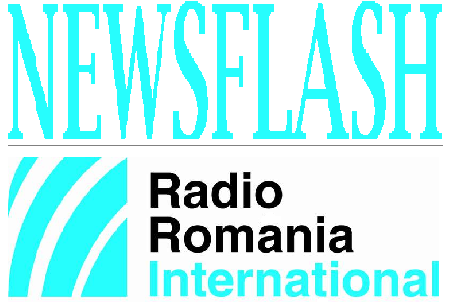Newsflash June 14
The Calafat-Vidin bridge, the second bridge over the Danube river between Romania and Bulgaria and the longest across this river, was opened on Friday in the presence of Romania’s prime minister Victor Ponta, of his Bulgarian counterpart Plamen Oresarsky and of the European commissioner for regional policy, Johannes Hahn. With a length of approximately 2 km, the bridge has two lanes in each direction, a railways track and a cycling lane. Joint Bulgarian and Romanian border police teams will conduct border checks on the Romanian side of the bridge for road traffic and on the Bulgarian side for railway traffic. According to estimates, over 100,000 vehicles are expected to cross the bridge every day.

Mihai Pelin, 14.06.2013, 20:04
The Calafat-Vidin bridge, the second bridge over the Danube river between Romania and Bulgaria and the longest across this river, was opened on Friday in the presence of Romania’s prime minister Victor Ponta, of his Bulgarian counterpart Plamen Oresarsky and of the European commissioner for regional policy, Johannes Hahn. With a length of approximately 2 km, the bridge has two lanes in each direction, a railways track and a cycling lane. Joint Bulgarian and Romanian border police teams will conduct border checks on the Romanian side of the bridge for road traffic and on the Bulgarian side for railway traffic. According to estimates, over 100,000 vehicles are expected to cross the bridge every day.
The research platform in Magurele, southern Romania, Friday saw the start of construction works for the infrastructure of a project called Extreme Light Infrastructure — Nuclear Physics, aimed at building the biggest laser in the world. The project is part of a wider theoretical and applied scientific research project carried out in Romania, the Czech Republic and Hungary and is conducted by a consortium of 13 European states. The total value of the project exceeds 356 million euros.
The European Broadcasting Union Friday called on Athens to revise its decision to shut down the Greek public radio and television and to resume broadcasts. The government headed by the Conservative Antonis Samaras said the measure was designed to help save money, and promised the public broadcasters would be reopened, but with smaller staff. The two Socialist parties in the ruling coalition are disgruntled with not having been consulted, and say they might support early election plans. Antonis Samaras has announced a meeting of the ruling coalition on Monday, to discuss the crisis generated by the closing of the public radio and television channels, which shocked the public and triggered strong reactions of the international community.
The government of Turkey announced on Friday it would not redevelop Gezi Park in Istanbul until a court has ruled on the legality of the plan. The announcement was made after Prime Minister Recep Tayyip Erdogan talked to representatives of the protesters in Taksim Square, who are demanding the resignation of the government. The original environmental protest focusing on Gezi Park snowballed into a large-scale movement against the Prime Minister, and spread to all major cities in Turkey. The protesters accuse the Prime Minister of a dictatorial rule and of trying to enforce Islamist policies. The clashes between the protesters and riot police have so far resulted in 4 deaths and over 7500 people wounded.
US president Barack Obama has for the first time authorised the provision of arms to the Syrian rebels following a White House announcement that it hold proof the Syrian government has used chemical weapons against the opposition forces fighting against president Bashar al Assad, Reuters news agency says. The US’s decision comes at a time when Syrian government forces are now targeting the north of the country, having captured the strategic town of Qusair last month with the open support of Hezbollah. At the end of last month, the European Union decided to lift the arms ban on the Syrian opposition, a decision opposed by Russia, which supports the regime in Damascus. Over 80,000 people have been killed since March 2011 in the armed conflict in Syria between the forces loyal to the Bashar al Assad regime and its opponents.




























